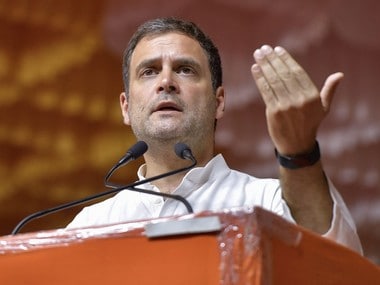In December 2013, after a crushing defeat in New Delhi at hands of the Aam Aadmi Party — still new on the scene — Congress president Rahul Gandhi, standing with his mother Sonia at party headquarters, said he was going to “learn” from Arvind Kejriwal and transform the Grand Old Party. “I think the Aam Aadmi Party has involved a lot of people who the traditional parties didn’t involve,” Rahul said. “We are going to learn from that and do a better job than anybody else in the country and involve people in ways you cannot even imagine now… I fundamentally believe that I am going to put all my efforts in transforming the organisation of Congress and give you an organisation you can be proud of”. [caption id=“attachment_6439551” align=“alignleft” width=“380”]  File image of Rahul Gandhi. PTI[/caption] His Twitter exchange with AAP chief and Delhi chief minister Arvind Kejriwal and latter’s trusted lieutenant Sanjay Singh is an indication that the Congress president has not learned his lessons. Rahul should first understand Kejriwal’s persona, how he crafted his politics, from a bureaucrat, NGO activist, a mass mobiliser, and the founder of the Aam Aadmi Party to a ruthless politician. Kejriwal’s unbridled ambition — where his personal and political interests are supreme — means he doesn’t spare anyone who gets in his way. He has proven himself a hard bargainer who doesn’t mind shifting the goalposts and who has no permanent friends or enemies. The essence of Kejriwal’s politics is to portray himself as the foremost leader in the Opposition ranks, who has the ability to take on Prime Minister Narendra Modi and BJP chief Amit Shah. In fact, Kejriwal is portraying himself as the prime challenger to the ruling dispensation. Though Modi remains a target, Kejriwal is constantly in search of a villain. Kejriwal, depending on the circumstances, and situation, finds a new set of villains — including institutions — who allow him to play the victim and hero all at once. Indeed, Kejriwal’s Twitter exchange with Rahul on Monday, indicates that he has found a new villain in the Congress president. Making public the way seat-sharing negotiations are progressing (or not progressing) isn’t prudent. Rahul thought otherwise, not realising Kejriwal would launch a retaliatory strike and paint him a villain standing in the way of Opposition unity. How events unfolded At 5.20 am on Monday, Rahul through a tweet attempted to convey the message that he was flexible during negotiations with Kejriwal, however, the latter was doing ‘U-turns’ and making it almost impossible to arrive at an agreement.
An alliance between the Congress & AAP in Delhi would mean the rout of the BJP. The Congress is willing to give up 4 Delhi seats to the AAP to ensure this.
— Rahul Gandhi (@RahulGandhi) April 15, 2019
But, Mr Kejriwal has done yet another U turn!
Our doors are still open, but the clock is running out. #AbAAPkiBaari
The AAP response was swift and severe. AAP’s Sanjay Singh, who was in negotiations with Congress general secretary PC Chacko, blasted Rahul, asking him to first weigh his party’s strength and then make a statement on social media.
पंजाब में AAP के 4 सांसद 20 विधायक Cong एक भी सीट नही देना चाहती, हरियाणा जहाँ Cong का एक सांसद वहाँ भी Cong एक सीट नही देना चाहती, दिल्ली जहाँ Cong के 0 MLA 0 MP वहाँ आप हमसे 3 सीट चाहते हैं क्या ऐसे होता है समझौता? आप दूसरे राज्यों में भाजपा को क्यों नही रोकना चाहते? https://t.co/tJSQBnvH7O
— Sanjay Singh AAP (@SanjayAzadSln) April 15, 2019
The AAP’s message was clear: the Congress was not only on a weak footing, but was also being unreasonable and working against interests of Opposition unity. The public exchange made clear that no Congress-AAP alliance was on the cards in Delhi and top leaders of both parties took to social media in an attempt to shift the blame. Ashutosh, the journalist-turned-AAP leader-turned political analyst, a hardcore votary of anti-Modi Opposition, summed up the situation on Twitter:
When leaders are resorting to twitter for making political statements then one should trust either they are fooling others or themselves. Real and serious politics is never done on social media. @ArvindKejriwal @RahulGandhi
— ashutosh (@ashutosh83B) April 15, 2019
Alliance would benefit AAP At this stage, it is difficult to predict how much the alliance would impact BJP’s prospects in Delhi’s seven seats, beyond making the elections interesting. But one thing is sure: If the alliance had occurred the way the AAP wanted, it would have given a huge boost to Kejriwal’s stature and enhanced his party’s standing. Even though Kejriwal has good friends such as Mamata Banerjee and Chandrababu Naidu, he is still struggling to find a place at the Oppostion high-table. Whether Kejriwal and his friends like it or not, Rahul continues to chair that table. Although Kejriwal’s entry would not have been a direct threat to Rahul’s position, the AAP chief has the capacity to steal the show. An AAP-Congress alliance would be more beneficial to the AAP than the Congress. The AAP has cut into the Congress vote since it entered the political scene. An alliance with Congress would have helped this young party broaden its support. The Delhi Assembly election is scheduled to occur seven months after the Lok Sabha polls. If the Congress has to challenge the AAP, Rahul has to take a different position vis-à-vis Kejriwal. It would not be out of place to remember that in last parliamentary election, when the Congress had ruled Delhi for 15 years, the Congress got nil seats and the BJP won all seven seats. Rahul needs to recall what he said five years ago.


)
)
)
)
)
)
)
)
)



